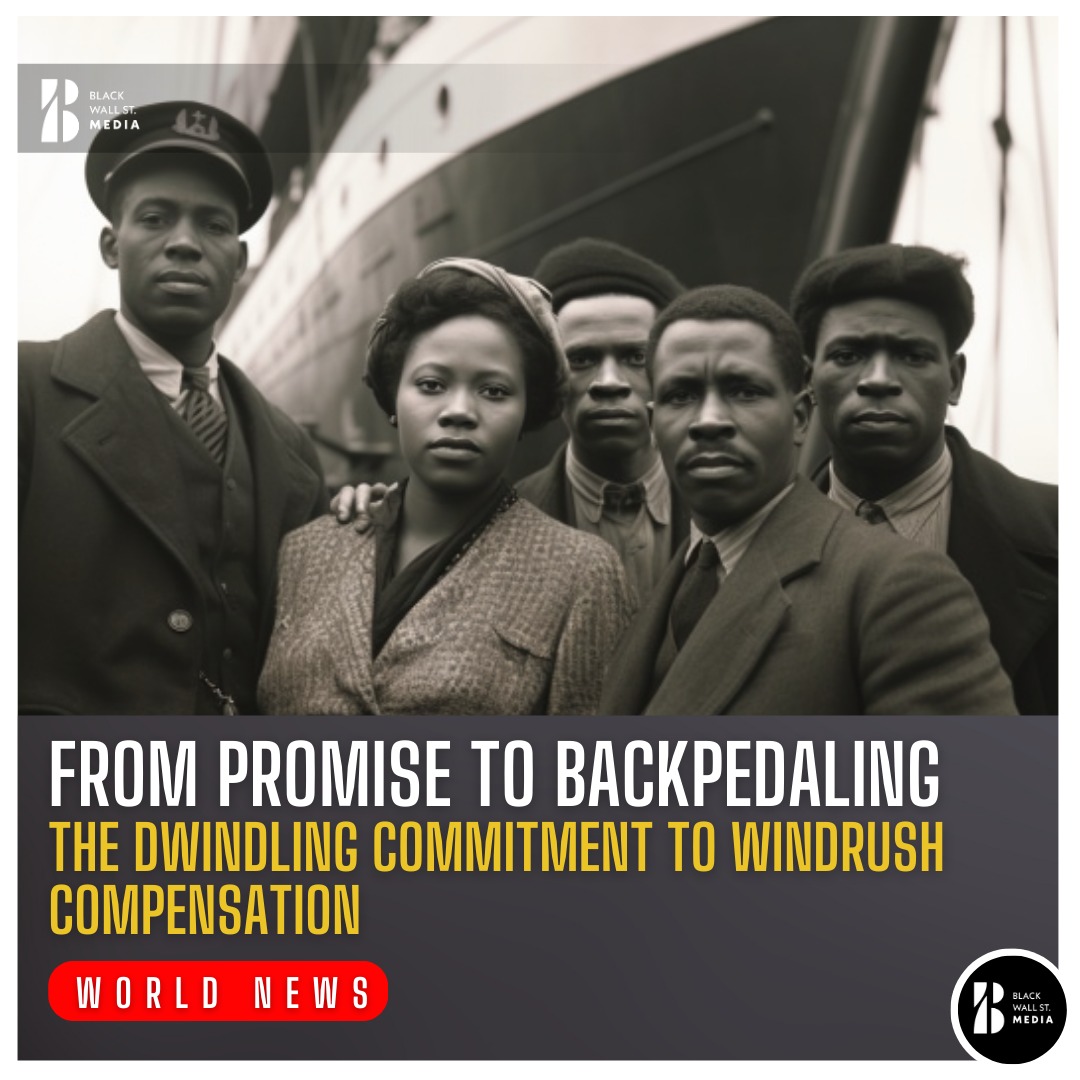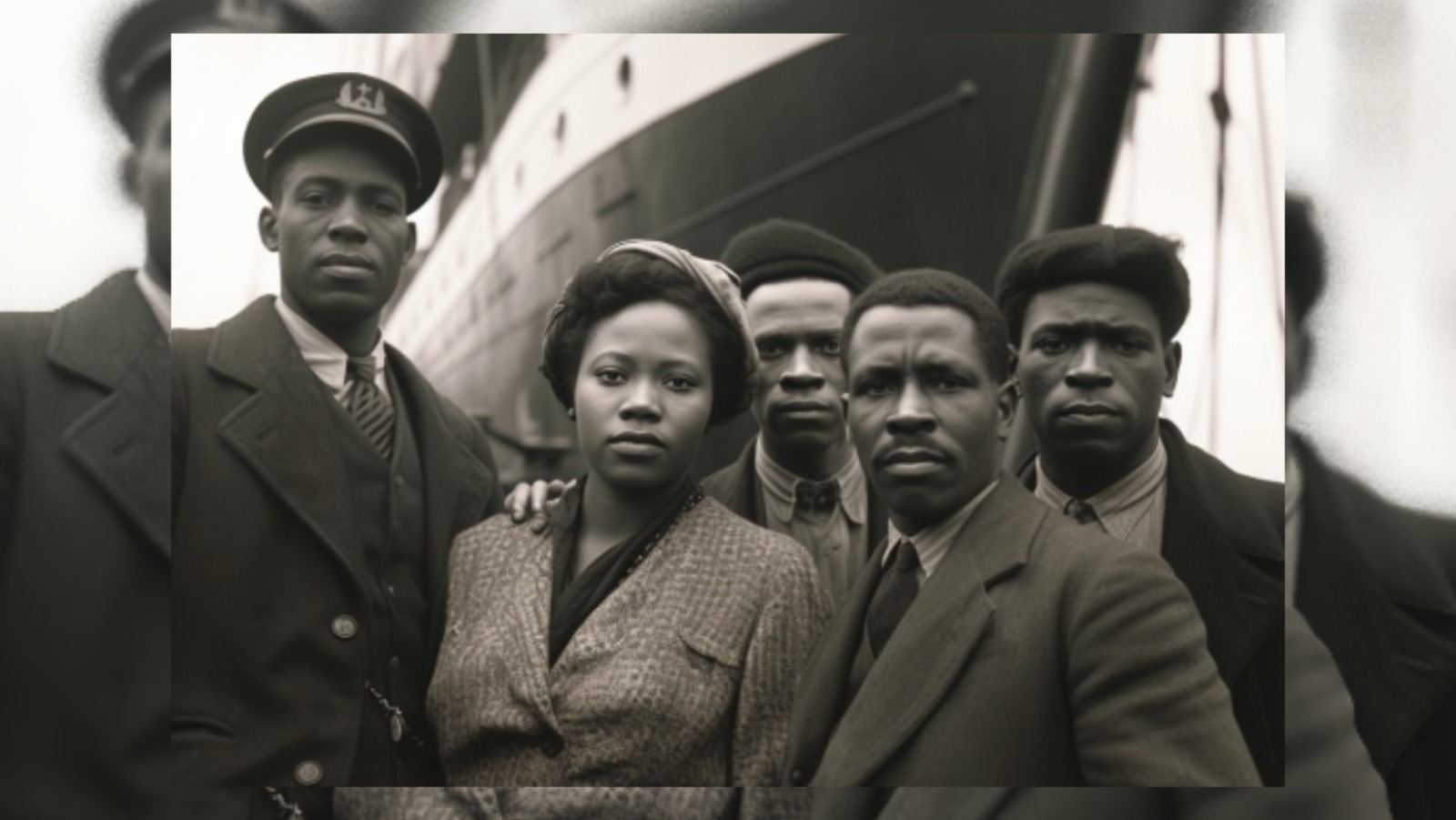Social Justice and Human Rights
From Promise to backpedaling
“From Promise to Backpedaling: The Dwindling Commitment to Windrush Compensation”
Black Wall St. MediaContributor

Introduction:
In the heart of modern Britain lies a grievous scar, a reminder of policies gone awry and lives irreversibly impacted.
The Windrush Scandal, named after the ship MV Empire Windrush which in 1948 brought workers from the Caribbean to the UK, continues to reverberate, challenging the nation’s ideals of justice, equality, and human rights.
As the Home Office unveils plans to curtail the Windrush Compensation Scheme, citing low application numbers, there emerges a critical question:
Is Britain truly committed to rectifying the wrongs of its past?
This article delves into the latest developments, the voices of resistance, and the continued struggle for justice for the Windrush victims
Justice for Windrush Scandal Victims: A Call to Action
The Home Office’s recent announcement of scaling back the Windrush Compensation Scheme has evoked widespread concern and disappointment, notably from the Action for Race Equality (ARE).
This compensation scheme was a commitment to rectify the agonies experienced by the countless victims of the “hostile environment” immigration policy of 2012.
A Dwindling Commitment
The decision to reduce the number of payments stems from the perception of low application numbers.
This action, coupled with other recent indications, signifies a potential government retreat from its earlier pledges made in the wake of the Windrush Scandal revelations in 2018.
While the Home Office cites lower application numbers as a justification, countless voices on the ground, especially those connected with the ARE’s Windrush Justice Programme, tell a different story.
The mistrust and fear ingrained in the affected community, primarily due to the Home Office’s stringent approach to immigration, have deterred many from coming forward.
Building Trust is Key
Jeremy Crook, ARE’s Chief Executive, emphasizes that trust, once lost, is not easily regained.
The Home Office, by prematurely deciding to close the compensation scheme, is potentially shutting doors on many deserving individuals.
There is an explicit call to keep the scheme running at least till the next general election, ensuring that no affected individual is left behind.
Wrong Approach from the Start?
Windrush survivor and advocate, Roland Houslin, is not taken aback by this development.
From the onset, there has been a discernable effort from the Home Office to limit the scheme’s scope, often downplaying the commendable efforts of lawyers and advocates working tirelessly to assist the Windrush Generation and their descendants.
Voices on the Ground Echo Concerns
Prominent Windrush campaigner, Patrick Vernon OBE, elucidates how the Home Office’s narrative has been to highlight their alleged efforts to reach out to the affected community, while covertly discrediting those challenging their approach.
Vernon’s demand is unambiguous – a transparent and just compensation mechanism for this monumental human rights breach that commenced with the Empire Windrush’s arrival in 1948.
The Fight Continues
Despite these setbacks, the Action for Race Equality is not standing still. They are actively partnering with numerous Windrush organizations and advocates throughout England and Wales to amplify support within community institutions.
With generous funding from several esteemed foundations, ARE is poised to extend its support to even more advocacy groups.
Recent Home Office statistics underline the importance and growing necessity of the compensation scheme, contradicting the perceived decline in its relevance.
Conclusion
The Windrush Scandal remains a haunting reminder of the profound challenges many individuals faced.
As we observed during the parliamentary event in May titled “The Windrush Scandal: Five years on”, the scars – legal, emotional, financial, and social – are still fresh.
The call for justice is louder than ever, and it is essential that every deserving individual finds their rightful place under the sun, with due reparations and recognition.
Are there similar incidents globally?
Various countries have faced similar issues involving immigration policies, statelessness, and discrimination. Here are some comparable situations from around the world:
The “Stolen Generations” in Australia: Between the 1910s and 1970s, many Indigenous Australian children were forcibly removed from their families by the Australian government and church missions. This was based on a policy that aimed to assimilate these children into white Australian society. The children were denied their cultural and familial heritage, leading to long-term psychological and cultural damage.
Japanese Internment in the US: During World War II, over 120,000 Japanese-Americans were forcibly interned in camps due to fears and prejudices after the attack on Pearl Harbor. Most of these individuals were US citizens or legal residents.
The Rohingya Crisis in Myanmar: The Rohingya, a Muslim minority in Myanmar, have faced discrimination and violence for decades. This has culminated in recent years with a significant number of them being driven from their homes, becoming stateless refugees.
Treatment of Migrant Workers in the Gulf Countries: Many migrant workers, especially those from South Asia, face discrimination, abuse, and unfavorable working conditions in Gulf countries. The “kafala” system, which ties the worker’s legal status directly to their employer, makes it difficult for them to escape abusive situations.
The Roma in Europe: The Roma, sometimes referred to as Gypsies, have faced centuries of discrimination and persecution across Europe. In many countries, they are marginalized, live in impoverished conditions, and lack access to basic services and education.
Dominican Republic and People of Haitian Descent: In 2013, a court ruling in the Dominican Republic retroactively removed citizenship from individuals whose parents were not Dominican residents. This ruling primarily affected Dominicans of Haitian descent, many of whom were rendered stateless or deported to Haiti, even if they had never lived there.
“Dreamers” in the US: The Deferred Action for Childhood Arrivals (DACA) program, initiated in 2012, protects young undocumented immigrants who were brought to the US as children from deportation. However, their status has been the subject of political battles, leaving many in a state of uncertainty regarding their futures in the US.
These are just a few examples that highlight the global challenges around immigration, nationality, and human rights.
While the specifics vary, many of these situations result from a combination of political decisions, prejudices, and economic factors, leading to significant hardships for the affected communities.
The journey towards rectification is long, and the recent Home Office decision seems a step backward. The fight for justice must go on.
Black Wall St. MediaContributor













